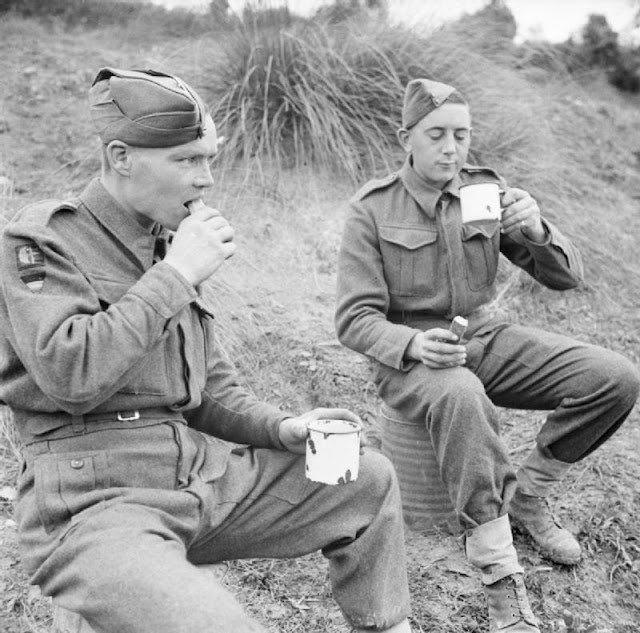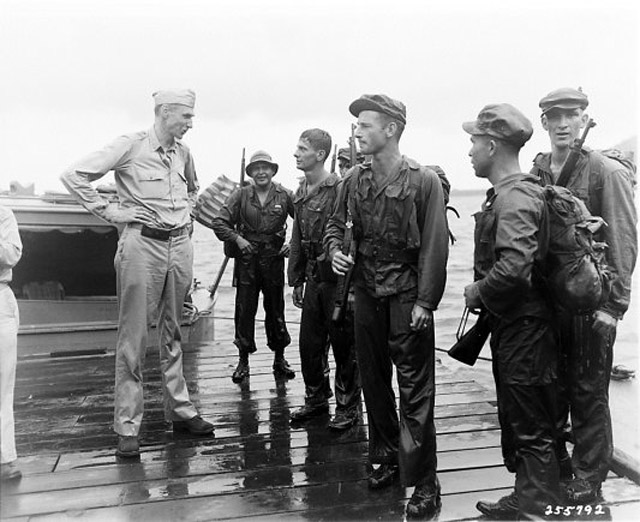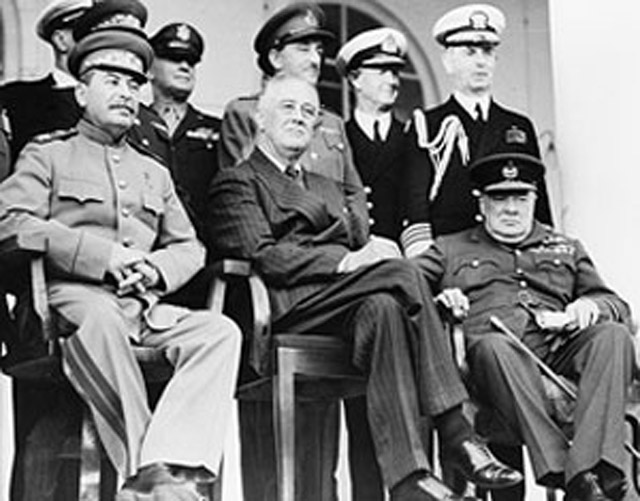Air Operations, CBI
BURMA- 7th Heavy Bomb Group B-24s attack port facilities at Rangoon and 490th Bomb Squadron B-25s attack Sagaing.
- P-51s from the 311th Fighter Groupís 530th Fighter Squadron down 4 Japanese fighters over Rangoon at 1155 hours.
- During the night, RAF Wellingtons attack targets in Rangoon.
- 8 14th Air Force P-40s attack barracks and other targets at Litsaoho
- 8 P-40 air-drop ammunition to Chinese Army forces encircled at Changte.
- 6 14th Air Force P-40s strafe the airfield at Luang Prabang and Tran Ninh.
Air Operations, Europe
RAF BOMBER COMMANDEvening Ops:
- 10 Mosquitos are sent to Essen and 1 to Duisburg, 10 aircraft lay mines off Brest and Cherbourg and there are 7 OTU sorties.
YUGOSLAVIA:
- XII Air Support Command B-25s attack barracks, port facilities, ships, and warehouses at Dubrovnik, Sibenik, and Zara.
FRANCE:
- P-38s of the 1st Fighter Group's 71st Fighter Squadron down 3 FW-109s over the French coast at 1210 hours while on the way to attack the Salon-de-Provence Airdrome, but they and the 15th Air Force B-26s the are escorting against targets in southern France are recalled because of bad weather.
- 15th Air Force B-24s, 15th Air Force P-38 fighter-bombers, and XII Air Support B-25s attack a rail tunnel at Dogna, north of Trieste.
- 15th Air Force B-17s attack the Rome/Ciampino Airdrome.
- NATAF fighter-bombers attack motor vehicles, troops, trucks, trains, and buildings in the battle area.
Air Operations, Gilberts
- 11 VII Bomber Command B-24s based at Nanomea attack Nauru Island.
- During the evening, a small number of Marshalls-based G4M 'Betty' bombers attack several US surface warships of the northern task force, but no damage results. The ships claim the downing of several of the 'Bettys'.
Air Operations, New Guinea
- Approximately 50 V Bomber Command B-24s attack the airfields at Boram and Wewak.
- More than 40 B-25s, B-26s, and A-20s attack trails near Finschhafen and occupied villages on the Huon Peninsula.
Air Operations, Solomons
- 6 42nd Medium Bomb Group B-25s attack targets around Mutupina Point.
- AirSols fighters attack numerous targets on Bougainville and in the Shortland Islands.
Allied Planning
For the next few days Churchill, Roosevelt and Stalin and their staffs meet for the first time at Teheran. The decision to invade western Europe in May 1944 is confirmed and a now more definite plan for the invasion of southern France, ANVIL is agreed. This has been an American idea up to now, the British perfer a Balkan operation, but Stalin's support gives it increased weight. Churchill accepts it, believing that if there are landing craft in the Mediterranean for ANVIL they might be available for other purposes. Perhaps the most important decision to emerge from the conference is Stalin's promise to join the war against Japan when Germany has been defeated.
There were problems of security at the conference and there is reason to believe that the Americans' accommodation was bugged. The Americans were solicitious throughout the proceedings not to appear to be with Britain and against the Soviet Union and in doing so perhaps give too much ground.
Stalin receives the ceremonial 'Sword of Stalingrad', made in Sheffield, by order of King George VI.
The start of the Tehran Conference attended by Stalin, Roosevelt and Churchill. The 'Big Three' reach agreement on military matters:
(1)The Partisans in Yugoslavia should be supported by supplies and equipment to the greatest possible extend, and also by commando operations.
(2)Agreed that, from the military point of view, it was most desirable that Turkey should come into the war on the side of the Allies before the end of the year.
(3)Took note of Marshal Stalin's statement that if Turkey found herself at war with Germany, and as a result Bulgaria declared war on Turkey or attacked her, the Soviets would immediately be at war with Bulgaria. The Conference further took note that this fact could be explicitly stated in the forthcoming negotiations to bring Turkey into the war.
(4)Took not that Operation OVERLORD [the Allied invasion of France] would be launched during May 1944, in conjunction with an operation against Southern France. The latter operation would be undertaken in as great a strength as availability of landing craft permitted. The Conference further took note of Marshal Stalin's Statement that the Soviet forces would launch an offensive at about the sam time with the object of preventing the German forces from transferring from the Eastern to the Western Front.
(5)Agreed that the military staffs of the Three Powers should henceforward keep in close touch with each other in regard to the impending operations in Europe. In particular it was agreed that a cover plan to mystify and mislead the enemy as regards these operations should be concerted between the staffs concerned. Stalin reiterates that the USSR will retain the frontiers laid down by the Nazi-Soviet Non-aggression Treaty of 1939 and the Russo-Finnish Treaty of 1940. He also states his hostility toward the Polish government-in-exile in London.
Battle of the Atlantic
U-542 is sunk by Wellington 'H' of No 179 Squadron. Radar contact is made in very bad weather. As the aircraft approaches a quarter of a mile away from the submarine, the Leigh Light is switched on revealing the U-boat which immediately puts up a heavy flak barrage. Six depth charges are dropped, four to starboard and two to port. The U-boat stops and then sinks.| Class | Type IXC/40 |
| CO | Oberleutnant zur See Christian Coester |
| Location | Atlantic, N of Madeira |
| Cause | Air attack |
| Casualties | 56 |
| Survivors | None |
Diplomatic Relations
The Colombian government proclaims a 'state of belligerency' with Germany, following the sinking of a Colombian steamer on November 27.
[Eastern Front
The Soviets make important gains northwest of Gomel, near Zhlobin. Army Group South surrounds huge Russian forces in the Korosten area, northwest of Kiev, inflicting heavy losses on them.
[Gilberts
Tarawa is completely secure. The small atoll was the scene of the most bitter, intense fighting in the Pacific war. In a little more than a week, 4,630 Japanese were killed. Only 17 Japanese and 125 Koreans are taken prisoner. US casualties are 1,115 killed or presumed killed and 2,292 wounded.
[Italy
A massive air and artillery bombardment signals the start of 8th Army's offensive across the Sangro. A new bridgehead is fairly quickly won and by the end of the day Indian 8th Division has penetrated nearly to Mozzogrogna. Also crossing the river is the New Zealand 2nd Division. The defending German 65th Division is badly shaken by the shelling and is in any case unusually poorly trained and badly equipped. The attack was intended to follow up the initial advance on 20 November but has been delayed by bad weather. This has given the Germans time to assemble reserves behind the 65th Division.
[Pacific
- The US submarine Bowfin (SS-287) sinks the Japanese army cargo ship Sydney Maru (5425t) and the merchant cargo ship Tonan Maru (9866t) off the central Philippines, but is damaged by Japanese gunfire and is forced to terminate her patrol.
- The US submarine Snook (SS-279) sinks the Japanese transport Yamafuku Maru (4928t) northwest of the Marianas.
- The US submarine Raton (SS-270) sinks the Japanese army cargo ships Hokko Maru (5347t) and Yuri Maru (6787t) north of New Guinea.
Images from November 28, 1943
|
|
Soldiers Enjoying Tea and Cakes |
 |

